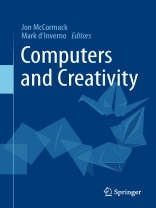This interdisciplinary volume introduces new theories and ideas on creativity from the perspectives of science and art. Featuring contributions from leading researchers, theorists and artists working in artificial intelligence, generative art, creative computing, music composition, and cybernetics, the book examines the relationship between computation and creativity from both analytic and practical perspectives. Each contributor describes innovative new ways creativity can be understood through, and inspired by, computers.
The book tackles critical philosophical questions and discusses the major issues raised by computational creativity, including: whether a computer can exhibit creativity independently of its creator; what kinds of creativity are possible in light of our knowledge from computational simulation, artificial intelligence, evolutionary theory and information theory; and whether we can begin to automate the evaluation of aesthetics and creativity in silico. These important, often controversial questions are contextualised by current thinking in computational creative arts practice. Leading artistic practitioners discuss their approaches to working creatively with computational systems in a diverse array of media, including music, sound art, visual art, and interactivity.
The volume also includes a comprehensive review of computational aesthetic evaluation and judgement research, alongside discussion and insights from pioneering artists working with computation as a creative medium over the last fifty years. A distinguishing feature of this volume is that it explains and grounds new theoretical ideas on creativity through practical applications and creative practice.
Computers and Creativity will appeal to theorists, researchers in artificial intelligence, generative and evolutionary computing, practicing artists and musicians, students and any reader generally interested in understanding how computerscan impact upon creativity. It bridges concepts from computer science, psychology, neuroscience, visual art, music and philosophy in an accessible way, illustrating how computers are fundamentally changing what we can imagine and create, and how we might shape the creativity of the future.
Computers and Creativity will appeal to theorists, researchers in artificial intelligence, generative and evolutionary computing, practicing artists and musicians, students and any reader generally interested in understanding how computers can impact upon creativity. It bridges concepts from computer science, psychology, neuroscience, visual art, music and philosophy in an accessible way, illustrating how computers are fundamentally changing what we can imagine and create, and how we might shape the creativity of the future.
Inhoudsopgave
Part I Art.- Chap. 1 The Painting Fool: Stories from Building an Automated Painter (Simon Colton).- Chap. 2 Creative Ecosystems (Jon Mc Cormack).- Chap. 3 Construction and Intuition: Creativity in Early Computer Art (Frieder Nake).- Chap. 4 Evaluation of Creative Aesthetics (Harold Cohen, Frieder Nake, David C. Brown, Paul Brown, Philip Galanter, Jon Mc Cormack, Mark d’Inverno).- Part II Music.- Chap. 5 Musical Virtuosity and Creativity (François Pachet).- Chap. 6 Live Algorithms: Towards Autonomous Computer Improvisers (Tim Blackwell, Oliver Bown, Michael Young).- Chap. 7 The Extended Composer (Daniel Jones, Andrew R. Brown, Mark d’Inverno).- Chap. 8 Between Material and Ideas: A Process-Based Spatial Model of Artistic Creativity (Palle Dahlstedt).- Chap. 9 Computer Programming in the Creative Arts (Alex Mc Lean, Geraint Wiggins).- Part III Theory.- Chap. 10 Computational Aesthetic Evaluation: Past and Future (Philip Galanter).- Chap. 11Computing Aesthetics with Image Judgment Systems (Juan Romero, Penousal Machado, Adrian Carballal, João Correia).- Chap. 12 Creativity Redefined: Bypassing the Gatekeepers of Appropriateness and Value (Alan Dorin, Kevin B. Korb).- Chap. 13 A Formal Theory of Creativity to Model the Creation of Art (Jürgen Schmidhuber).- Chap. 14 Generative and Adaptive Creativity: A Unified Approach to Creativity in Nature, Humans and Machines (Oliver Bown).- Chap. 15 Creating New Informational Primitives in Minds and Machines (Peter Cariani).- Part IV Epilogue.- Chap. 16 Computers and Creativity: The Road Ahead (Jon Mc Cormack, Mark d’Inverno).
Over de auteur
Jon Mc Cormack is an electronic media artist and researcher in computing. He holds a degree in Applied Mathematics and Computer Science from Monash University, a Graduate Diploma of Art (Film and Television) from Swinburne University and a Ph D in Computer Science from Monash University, Melbourne. He is currently Associate Professor in Computer Science, an ARC Australian Research Fellow and director of the Centre for Electronic Media Art (CEMA) at Monash University. His research spans generative art and design, evolutionary systems, creativity, visualisation, interaction, machine learning, L-systems and developmental models. His artworks have been widely exhibited at leading galleries, museums and symposia, including the Museum of Modern Art (New York, USA), Tate Gallery (Liverpool, UK), ACM SIGGRAPH (USA), Prix Ars Electronica (Austria) and the Australian Centre for the Moving Image (Australia). He is the recipient of 16 awards for new media art and research including prizes at Ars Electronica (Austria), Images du Futur (Canada), New Voices, New Visions (USA), Alias/Wavefront (USA), The John Lansdown Award for Interactive Media (Europe/UK), and Nagoya Biennial (Japan).
Mark d’Inverno holds an MA and MSc in Mathematics from Oxford University and a Ph D from University College London in Artificial Intelligence. He is Professor of Computer Science at Goldsmiths, University of London and for four years between 2007 and 2011 was head of the Department of Computing which has championed interdisciplinary research and teaching around computers and creativity for nearly a decade. He has published over 100 articles including books, journal and conference articles and led research projects in a diverse range of fields relating to computer science including multi-agent systems, systems biology, art, music and social media. During the final editing of this book he took a research sabbatical shared betweenthe Artificial Intelligence Research Institute and the Sony Computer Science Laboratory in Paris. He is currently the principal investigator or co-investigator on a range of EU and UK projects spanning community building, sharing social experiences, inspiring creativity, cultural engagement and music education. He is a critically acclaimed jazz pianist and composer and over the last 25 years has led a variety of successful bands in a range of different musical genres.












